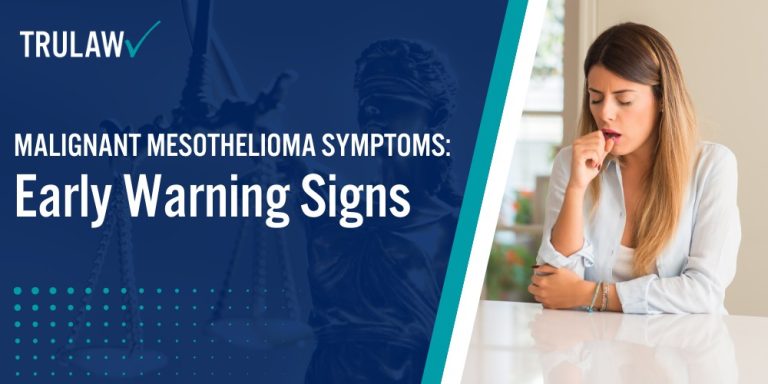The progression and presentation of mesothelioma symptoms depend significantly on where cancer cells develop in the body.
Each type of mesothelioma affects different organs and body systems, leading to distinct symptom patterns that medical professionals use to diagnose mesothelioma.
Early detection and proper identification of these symptoms play a vital role in treatment outcomes.
Pleural Mesothelioma: Respiratory and Chest-Related Symptoms
Malignant pleural mesothelioma, also called pleural mesothelioma, primarily affects the protective lining of the lungs.
This form accounts for the majority of cases and presents with symptoms that can initially resemble common respiratory conditions, often leading to delayed mesothelioma diagnosis.
Common respiratory and chest symptoms include:
- Shortness of Breath: Difficulty breathing, especially during physical activity or when lying flat
- Persistent Cough: A dry, non-productive cough that doesn’t improve with time
- Chest Pain: Sharp or dull pain, particularly when breathing deeply or coughing
- Pleural Effusion: Fluid buildup between the chest wall and lungs, causing increased breathing difficulty
These symptoms typically worsen over time as the disease progresses, with many patients experiencing increased chest discomfort and breathing challenges that significantly impact daily activities.
Peritoneal Mesothelioma: Abdominal Manifestations
Malignant peritoneal mesothelioma develops in the abdominal cavity’s lining and creates distinct symptoms that affect digestive function and comfort.
Patients often report changes in their eating habits and digestive patterns before receiving their diagnosis.
Primary abdominal symptoms include:
- Abdominal Pain: Persistent discomfort or pain in the stomach area
- Bowel Changes: Constipation, diarrhea, or other irregular bowel movements
- Bloating: Noticeable swelling or fluid accumulation in the abdomen
- Appetite Changes: Reduced appetite leading to unexplained weight loss
The presence and severity of these symptoms often prompt medical evaluation, though early symptoms may be subtle.
As the condition advances, patients typically experience more pronounced digestive issues and increasing abdominal discomfort.
Pericardial Mesothelioma: Cardiovascular Symptoms
Pericardial mesothelioma affects the protective lining around the heart, causing serious cardiovascular complications.
This rare form accounts for about 1% of all mesothelioma cases and often presents with symptoms that can be mistaken for heart disease or other cardiac conditions.
Common cardiovascular symptoms include:
- Chest Pain: Sharp or dull pain in the chest that may worsen with deep breathing or physical activity
- Heart Palpitations: Irregular heartbeat patterns or racing heart sensations
- Dyspnea: Difficulty breathing, especially when lying flat or during physical exertion
- Fluid Accumulation: Build-up of fluid around the heart (pericardial effusion) causing pressure
These cardiovascular symptoms often appear gradually and may become more severe as the disease progresses.
Early detection through imaging tests and tissue biopsies helps doctors develop appropriate treatment plans for patients with pericardial mesothelioma.
Testicular Mesothelioma: Scrotal and Urological Signs
Testicular mesothelioma is the rarest form of this cancer, developing in the membrane that covers the testicles.
This type presents unique challenges for diagnosis due to its similarity to more common testicular conditions.
Key symptoms of testicular mesothelioma include:
- Testicular Swelling: Noticeable enlargement of one or both testicles
- Scrotal Mass: Development of a painless lump or thickening within the scrotum
- Local Pain: Discomfort or aching in the testicles or groin area
- Fluid Build-up: Accumulation of fluid in the scrotum causing swelling
These symptoms may initially appear mild but typically worsen over time.
Medical professionals recommend immediate evaluation of any testicular abnormalities, as early detection and treatment can significantly impact patient outcomes.



